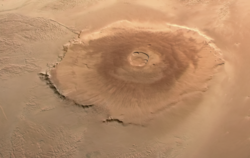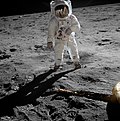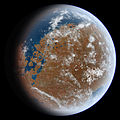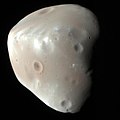The common surface features of Mars include dark slope streaks, dust devil tracks, sand dunes, Medusae Fossae Formation, fretted terrain, layers, gullies...
122 KB (15,036 words) - 08:07, 4 May 2025
The surface color of the planet Mars appears reddish from a distance because of rusty atmospheric dust. From close up, it looks more of a butterscotch...
17 KB (1,647 words) - 17:16, 3 May 2025
Although very small amounts of liquid water may occur transiently on the surface of Mars, limited to traces of dissolved moisture from the atmosphere and...
289 KB (30,525 words) - 02:28, 7 April 2025
has been found on Mars. Cumulative evidence suggests that during the ancient Noachian time period, the surface environment of Mars had liquid water and...
213 KB (20,770 words) - 08:47, 6 May 2025
The geology of Mars is the scientific study of the surface, crust, and interior of the planet Mars. It emphasizes the composition, structure, history,...
65 KB (7,237 words) - 10:47, 10 April 2025
knowledge of the nature of the features. For example, Nix Olympica (the snows of Olympus) has become Olympus Mons (Mount Olympus). The surface of Mars as seen...
209 KB (18,461 words) - 12:14, 11 May 2025
C. Hoagland, believe the "Face on Mars" to be evidence of a long-lost Martian civilization along with other features they believe are present, such as...
24 KB (2,338 words) - 16:10, 3 May 2025
Phobos (moon) (redirect from List of geological features on Phobos)
completes an orbit in just 7 hours and 39 minutes. As a result, from the surface of Mars it appears to rise in the west, move across the sky in 4 hours and...
73 KB (7,414 words) - 08:38, 23 April 2025
The surface of Venus is dominated by geologic features that include volcanoes, large impact craters, and aeolian erosion and sedimentation landforms. Venus...
22 KB (2,743 words) - 07:38, 14 February 2025
The climate of Mars has been a topic of scientific curiosity for centuries, in part because it is the only terrestrial planet whose surface can be easily...
113 KB (11,741 words) - 16:09, 7 May 2025
The two moons of Mars are Phobos and Deimos. They are irregular in shape. Both were discovered by American astronomer Asaph Hall in August 1877 and are...
44 KB (4,642 words) - 00:48, 28 April 2025
The terraforming of Mars or the terraformation of Mars is a hypothetical procedure that would consist of a planetary engineering project or concurrent...
68 KB (6,559 words) - 20:52, 9 April 2025
of Mars. Scientists have known since the Mariner 9 mission in 1972 that volcanic features cover large portions of the Martian surface. These features...
55 KB (6,426 words) - 22:32, 5 May 2025
albedo features of Mars are the light and dark features that can be seen on the planet Mars through an Earth-based telescope. Before the age of space probes...
40 KB (1,168 words) - 07:31, 9 May 2025
Mars may contain ores that would be very useful to potential colonists. The abundance of volcanic features together with widespread cratering are strong...
27 KB (3,423 words) - 10:50, 27 March 2025
the steps of the National Air and Space Museum he described long-term plans which would culminate in a human mission to the surface of Mars. By December...
23 KB (3,039 words) - 20:21, 29 April 2025
Olympus Mons (category Volcanoes of Mars)
volcano on Mars. It is over 21.9 km (13.6 mi; 72,000 ft) high as measured by the Mars Orbiter Laser Altimeter (MOLA), about 2.5 times the elevation of Mount...
30 KB (3,604 words) - 00:12, 4 April 2025
impacts the Martian surface, and the fine, toxic dust that covers the planet. Mars has an atmosphere, but it is unbreathable and thin. Surface temperatures fluctuate...
127 KB (12,758 words) - 23:44, 6 May 2025
past. Lobate convex features on the surface known as viscous flow features and lobate debris aprons, which show the characteristics of non-Newtonian flow...
51 KB (6,188 words) - 13:06, 30 March 2025
Triton Common rigid surface features include: Impact craters (though rarer on bodies with thick atmospheres, the largest being Hellas Planitia on Mars) Dunes...
42 KB (3,834 words) - 20:19, 24 October 2024
The Mars ocean theory states that nearly a third of the surface of Mars was covered by an ocean of liquid water early in the planet's geologic history...
41 KB (4,774 words) - 13:38, 17 December 2024
Outflow channels (category Surface features of Mars)
that most of the channels were cut since the early Hesperian, though the age of the features is variable between different regions of Mars. Some outflow...
11 KB (1,431 words) - 10:34, 26 March 2025
Deimos (moon) (redirect from List of geological features on Deimos)
designation: Mars II) is the smaller and outer of the two natural satellites of Mars, the other being Phobos. Deimos has a mean radius of 6.2 km (3.9 mi)...
30 KB (2,842 words) - 08:11, 9 April 2025
The idea of sending humans to Mars has been the subject of aerospace engineering and scientific studies since the late 1940s as part of the broader exploration...
56 KB (5,804 words) - 12:05, 11 May 2025
Mars Exploration Program (MEP) is a long-term effort to explore the planet Mars, funded and led by NASA. Formed in 1993, MEP has made use of orbital spacecraft...
36 KB (3,060 words) - 19:15, 16 December 2024
The study of surface characteristics (or surface properties and processes) is a broad category of Mars science that examines the nature of the materials...
14 KB (1,897 words) - 19:08, 24 April 2025
compositions of most surface soils and dust on Mars, providing implications to Martian surficial processes. Hematite: Broad absorption features near 500 and...
72 KB (6,353 words) - 14:21, 11 March 2025
Martian regolith (redirect from Mars dust settling)
regolith is the fine blanket of unconsolidated, loose, heterogeneous superficial deposits covering the surface of Mars. The term Martian soil typically...
48 KB (4,823 words) - 02:23, 1 May 2025
Characterize the surface features and geological processes on Mars. Determine the composition, distribution and physical properties of surface minerals, rocks...
45 KB (4,563 words) - 05:39, 27 April 2025
atmospheric density on Mars is equal to the density found 35 km (22 mi) above the Earth's surface and is ≈0.020 kg/m3. The atmosphere of Mars has been losing...
149 KB (15,316 words) - 14:36, 6 May 2025


























